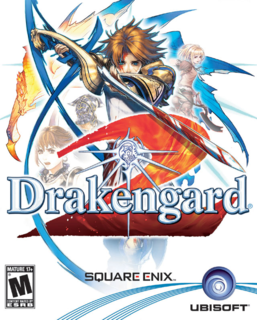The story of Drakengard 2 is Drakengard-lite: not very entertaining, but better for you.
Nowe, the protagonist of Drakengard 2, is a young knight full of hope and kindness. He joined the order of the Knights of the Seal to serve and protect humanity, but when he discovers that the Knights are oppressing people seemingly because of their allegiances in the war of Drakengard 18 years earlier, he becomes disillusioned. Enter a young woman, Manah, who leads a revolt intent on destroying the Knights of the Seal and their grip on the world, and Nowe is faced with killing the people he thought he needed to protect. So instead, after killing several dozens of them (while begging them to stop fighting him) he does what any kind and gentle hero would do and switches sides. From this point on in the game he turns his considerable swordsmanship against the Knights he used to fight alongside instead (also pleading with them not to fight back as the player sends hundreds of them to that great pixel in the sky).
The Drakengard series borrows greatly from the Dynasty Warriors games in that you direct the mythical skills of a single character (and his dragon, in this case) against entire armies at a time, and, typically without breaking a sweat, dispatch scores of them and still get home in time for dinner. But where other games have reasonable explanations for why you slog through geyser after geyser of enemy blood, Drakengard 2 takes a completely different approach. Here, your hero really is a hero in the most classic sense of the word. All the more ridiculous, then, that we're expected to ignore what it is he's doing as a gameplay element. I mean, plenty of games get the hero to dispatch enemies, but if Caim in the original game is like the Punisher, then Nowe is a shoo-in for Spider-Man. At least in the dialogue he is. So why does he kill kill kill the entire game when he treasures life above all else? And if that wasn't enough, the overall storyline is like Drakengard for kids. Gone are the dark cast of anti-heros, gone are the terrifying tales behind the weapons you wield, and gone are the discordant design of music and ambiance in the first game. Instead we have brave knights and oppressed villagers rising to fight for freedom. It's conceptually similar to taking a Grimm fairy tale and getting Disney to write a sequel, making sure to ask them to include a plot so see-through you can guess the ending within about 4 game chapters. Drakengard didn't bring the gamer much in terms of new ways to beat up enemies, but it did break almost all the barriers of normalcy with its very disturbing story. To make matters worse, it seems as though entire portions of the story of Drakengard 2 were added just to give the player "more content" (i.e., more enemies to kill kill kill).
Even outside of story, Drakengard 2 pales in almost every way to its darker, older brother. Adding playable characters to the mix is a bonus, but not much of one since it's just a new sprite for a given family of weapons. Legna, your dragon, handles like a 747 compared to Angelus (the first game's dragon), and while the variety in breath weapons for Legna's sequences seems cool at first, it is ultimately inferior to the magic system of Angelus. The only absolute improvements I can think of is the addition of extra combo sequences (though mashing attack works for 98% of the game), and the addition of dragon magic during ground combat sequences.
Overall, I feel Drakengard 2 was a weak outing for the two-part series. If there ever is to be a sequel I hope Cavia can capture the dark tones of the original again, because if they aren't going to offer us gameplay that breaks the mold they'd better give us some reason to keep slashing our way through enemies, no matter how much we don't want to kill them.

